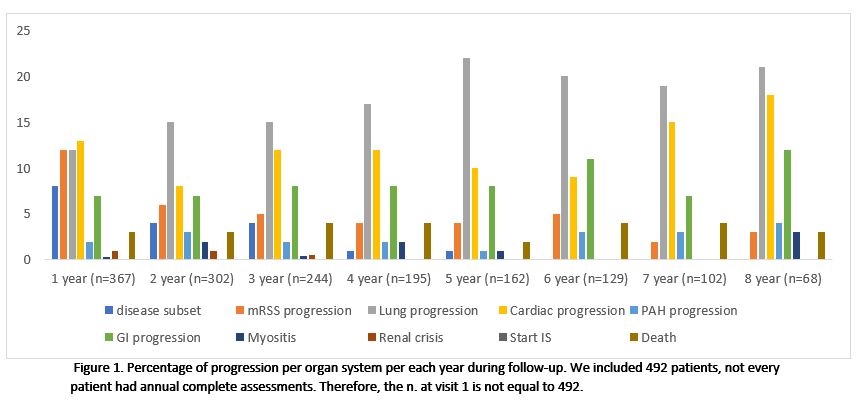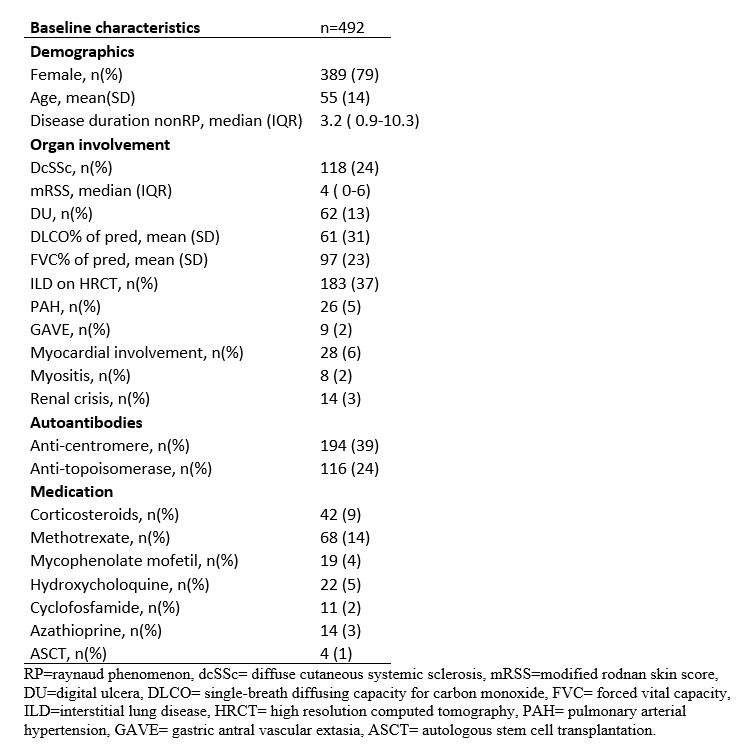Session Information
Session Type: Poster Session B
Session Time: 9:00AM-11:00AM
Background/Purpose: Systemic Sclerosis (SSc) disease course can range from mild, to very severe with progressive organ involvement within months. Guidelines for follow-up are mainly based on expert consensus, and advocate annual assessment. So far, no data driven guidelines exist that describe tailormade systematic assessments for individual patients in line with individual disease course.
In this study we aim to develop a tailormade model to guide annual assessment in individual SSc patients. To address this we 1) determined disease progression in all SSc patients participating in the prospective Leiden SSc cohort with ≥ two visits and 2) applied machine learning to predict progression in patients with complete data available at ≥ 3 time points to determine the outcome.
Methods: Disease progression, evaluated in all SSc patients, was defined per organ system: skin (based on modified Rodnan Skin Score (mRSS) and disease subset), lung (interstitial lung disease and pulmonary function test), myocardial (ejection fraction, arrhythmias, cardiac events), gastro-intestinal (GI) (GAVE, weight loss AND anemia), pulmonary arterial hypertension (PAH), renal crisis, and myositis. The primary endpoint in the prediction model was defined as progression in ≥ 1 organ system, and/or start of immunosuppression (IS) or death between the two most recent visits. To identify patients at risk, we used a machine learning approach known as elastic net regularization using 90 independent patient variables (100% complete) to predict progression. The patients with complete data available at 3 time points were randomly divided over a training (75%) and test (25%) set in order to perform internal validation of the final model. By expert assessment of the test characteristics, including swarm plots of the probability scores, cut-offs were identified for low, intermediate and high risk for disease progression.
Results: In 492 SSc patients (range of follow-up 2-10 years), disease progression during total follow-up was observed in 52% after median 4 years (range 1-8), including myocardial progression in 29%, lung progression in 23%, skin progression in 16%, and death in 12%. Complete data of ≥3 visits were available in n=248. The primary endpoint, i.e. progression at most recent visit, occurred in 24% (median follow-up duration 5 years (range 3-10)). Identified predictors included: previous IS treatment, previous GI or heart progression, previous cardiac event (heart attack, pacemaker), PAH, mRSS, creatinine kinase and diffusing capacity for carbon monoxide. Performance of the model in the test set showed a ROC AUC of 0.66. With the aim to optimize negative predictive value (NPV) cut-offs of probability scores were determined: low risk for disease progression (< 0.197, NPV 1.0; 29% of patients), intermediate risk (0.197-0.223, NPV 0.82; 27%) and high risk ( > 0.223, NPV 0.78; 44%).
Conclusion: Our data confirm the severe nature of SSc with cumulative progression in 52%. Although precise risk stratification for the individual patient is difficult, a machine learning approach enabled us to classify 29% of patients as ‘low risk’. In this group annual assessment programs might be less extensive.
 Figure 1. Percentage of progression per organ system per each year during follow-up. We included 492 patients, not every patient had annual complete assessments. Therefore, the n. at visit 1 is not equal to 492.
Figure 1. Percentage of progression per organ system per each year during follow-up. We included 492 patients, not every patient had annual complete assessments. Therefore, the n. at visit 1 is not equal to 492.
To cite this abstract in AMA style:
van Leeuwen N, Maurits M, Liem S, Ciaffi J, Ajmone Marsan N, Ninaber M, Huizinga T, de Vries-Bouwstra J. Machine Learning Assisted Prediction of Progression in Systemic Sclerosis Patients: An Approach to Concise, Tailored Model Construction Using Outpatient Clinical Data [abstract]. Arthritis Rheumatol. 2020; 72 (suppl 10). https://acrabstracts.org/abstract/machine-learning-assisted-prediction-of-progression-in-systemic-sclerosis-patients-an-approach-to-concise-tailored-model-construction-using-outpatient-clinical-data/. Accessed .« Back to ACR Convergence 2020
ACR Meeting Abstracts - https://acrabstracts.org/abstract/machine-learning-assisted-prediction-of-progression-in-systemic-sclerosis-patients-an-approach-to-concise-tailored-model-construction-using-outpatient-clinical-data/

